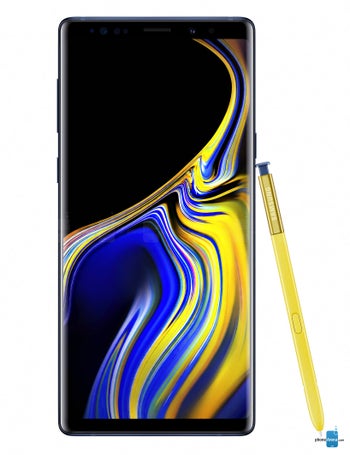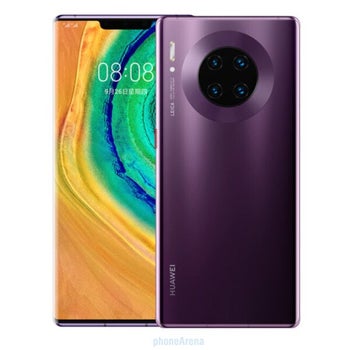Samsung Galaxy Note9 vs Huawei Mate 30 Pro Specs Comparison
Compare mobile phone specifications of up to three devices at once. Our specs comparison tool helps you find and compare the perfect phone for your needs.
|
|
|
| Samsung Galaxy Note9 | Huawei Mate 30 Pro |
|
Released
·
Aug 24, 2018
|
Released
·
Dec 10, 2019
|
|
6.4-inch · 2960x1440px
|
6.5-inch · 2400x1176px
|
|
Dual camera
|
Quad camera
|
|
6GB · 128GB
|
8GB · 256GB
|
|
4000 mAh
|
4500 mAh
|
Design
| Dimensions | |
|---|---|
| 6.37 x 3.01 x 0.35 inches 161.9 x 76.4 x 8.8 mm |
6.22 x 2.88 x 0.35 inches 158.1 x 73.1 x 8.8 mm |
| Weight | |
| 7.09 oz (201.0 g) | 6.98 oz (198.0 g) |
| Materials | |
| Back: Glass (Corning Gorilla Glass 5) Frame: Aluminum | Back: Glass (Corning Gorilla Glass 6) Frame: Aluminum |
| Resistance | |
| Water, Dust; IP68 | Water, Dust; IP68 |
| Biometrics | |
| Iris scanner, 2D Face unlock, Fingerprint (touch) | 3D Face unlock, Optical in-screen fingerprint |
| Features | |
| Notification light, Stylus | |
| Keys | |
| Left: Volume control, Lock/Unlock key; Right: Other | Right: Lock/Unlock key |
| Colors | |
| Midnight black, Ocean blue, Cloud silver, Lavender purple | Space silver, Cosmic purple, Black, Emerald green |
Display
| Size | |
|---|---|
| 6.4-inch | 6.5-inch |
| Resolution | |
| 2960x1440px, 18.5:9 ratio, 516 PPI | 2400x1176px, 18.5:9 ratio, 409 PPI |
| Technology | |
| Super AMOLED | OLED |
| Screen-to-body | |
| 83.51 % | 94.06 % |
| Features | |
| HDR support, Scratch-resistant glass (Corning Gorilla Glass 5), Ambient light sensor, Proximity sensor | HDR support, Scratch-resistant glass (Corning Gorilla Glass 6), Ambient light sensor, Proximity sensor |
Hardware
| System chip | |
|---|---|
| Qualcomm Snapdragon 845 SDM845 (10 nm) | HiSilicon Kirin 990 (7 nm) |
| Processor | |
| Octa-core 2800 MHz Kryo 385 |
Octa-core 2860 MHz ARM Cortex-A76 and ARM Cortex-A55 |
| GPU | |
| Adreno 630 | Mali-G76 MP16 |
| RAM | |
| 6GB (LPDDR4) | 8GB (LPDDR4) |
| Internal storage | |
| 128GB | 256GB |
| Storage expansion | |
| microSDXC up to 512 GB | Nano Memory (NM) up to 256 GB |
| OS | |
| Android (10, 9.0 Pie, 8.1 Oreo), Samsung One UI | Android (10), EMUI 10 UI |
Battery
| Capacity | |
|---|---|
| 4000 mAh | 4500 mAh |
| Type | |
| Li - Ion | Li - Polymer |
| Charging | |
| Qualcomm Quick Charge 2.0, Samsung Adaptive Fast Charging, Qi and Powermat wireless charging | Huawei SuperCharge, Qi wireless charging, Reverse wireless charging |
| Charge speed | |
| Wired: 40.0W Wireless: 27.0W |
|
Camera
| Rear | |
|---|---|
| Dual camera | Quad camera |
| Main camera | |
| 12 MP (OIS, PDAF) Aperture size: F1.5/F2.4 Focal length: 26 mm Sensor size: 1/2.55" Pixel size: 1.4 μm |
40 MP (OIS, PDAF) Aperture size: F1.6 Focal length: 27 mm Sensor size: 1/1.7" |
| Second camera | |
| 12 MP (Telephoto, OIS, Autofocus) Optical zoom: 2.0x Aperture size: F2.4 Focal Length: 52 mm Sensor size: 1/3.4" Pixel size: 1 μm |
40 MP (Ultra-wide, PDAF) Aperture size: F1.8 Focal Length: 18 mm Sensor size: 1/1.5" |
| Third camera | |
| 8 MP (Telephoto, OIS, PDAF) Optical zoom: 3.0x Aperture size: F2.4 Focal Length: 80 mm Sensor size: 1/4" |
|
| Fourth camera | |
| ToF 3D depth sensing | |
| Flash | |
| LED | Dual LED |
| Video recording | |
| 3840x2160 (4K UHD) (60 fps), 1920x1080 (Full HD) (240 fps), 1280x720 (HD) (960 fps) Time-lapse video, Hyperlapse, Continuous autofocus, Object tracking, EIS | 3840x2160 (4K UHD) (60 fps), 1920x1080 (Full HD) (960 fps), 1280x720 (HD) (7680 fps) EIS |
| Front | |
| 8 MP (Wide Angle, Autofocus), Video capture: 2560x1440 (QHD) (30 fps) | 32 MP (Dual-Camera, HDR), Video capture: 1920x1080 (Full HD) |
Connectivity & Features
| Bluetooth | |
|---|---|
| 5.0 | 5.1 |
| WLAN | |
| 802.11 a,b,g,n,ac,dual-band MIMO, Wi-Fi Direct, Hotspot | 802.11 a,b,g,n,ac,dual-band Wi-Fi Direct, Hotspot |
| USB | |
| Type-C, USB 3.1 | Type-C, USB 3.1 |
| Hearing aid compatible | |
| M4/T3 | |
| Location | |
| GPS, A-GPS, Glonass, Cell ID, Wi-Fi positioning | GPS, A-GPS, Glonass, Galileo, BeiDou, Dual-band positioning, Cell ID, Wi-Fi positioning |
| Sensors | |
| Accelerometer, Gyroscope, Compass, Hall (for flip covers), Barometer | Accelerometer, Gyroscope, Compass, Hall (for flip covers), Barometer |
| Other | |
| NFC, ANT+ | NFC, Infrared |
Multimedia
| Headphones | |
|---|---|
| 3.5mm jack | No 3.5mm jack |
| Speakers | |
| Earpiece, Multiple speakers | Earpiece, Multiple speakers |
| Features | |
| 32-Bit DAC, Dolby Atmos | aptX-HD |
| Screen mirroring | |
| Wireless screen share | Wireless screen share |
| Additional microphone(s) | |
| Noise cancellation | Noise cancellation |
Cellular
| 4G (FDD) | |
|---|---|
| Bands 1(2100), 2(1900), 3(1800), 4(AWS-1), 5(850), 7(2600), 8(900), 12(700 a), 13(700 c), 14(700 PS), 17(700 b), 18(800 Lower), 19(800 Upper), 20(800 DD), 25(1900+), 26(850+), 28(700 APT), 29(700 d), 30(2300 WCS), 66(AWS-3), 71(600) | Bands 1(2100), 2(1900), 3(1800), 4(AWS-1), 5(850), 7(2600), 8(900), 9(1800), 12(700 a), 17(700 b), 18(800 Lower), 19(800 Upper), 20(800 DD), 26(850+), 28(700 APT), 32(1500 L-band) |
| 4G (TDD) | |
| Bands 38(2600), 39(1900+), 40(2300), 41(2600+), 46 | Bands 34(2000), 38(2600), 39(1900+), 40(2300), 41(2600+) |
| 3G | |
| Bands 5(850), 8(900), 4(1700/2100), 2(1900), 1(2100) | Bands 1(2100), 2(1900), 3(1800), 4(1700/2100), 5(850), 8(900) |
| Data Speed | |
| LTE-A Pro Cat 18 (1200/150 Mbit/s), HSDPA+ (4G) 42.2 Mbit/s, HSUPA | LTE-A, HSDPA+ (4G) 42.2 Mbit/s, HSUPA 5.76 Mbit/s |
| Dual SIM | |
| Yes | |
| SIM type | |
| Nano SIM | Nano SIM |
| HD Voice | |
| Yes | |
| VoLTE | |
| Yes | |
Regulatory Approval
| FCC approval | |
|---|---|
| Date approved: Jul 03, 2018 FCC ID value: A3LSMN960U | |
| Measured SAR | |
| Head: 0.27 W/kg Body: 0.76 W/kg Simultaneous Transmission: 1.59 W/kg Wireless Router: 1.35 W/kg Phablet: 3.90 W/kg |
|
Buyers information
| MSRP | |
|---|---|
| $ 1000 | |
| In The Box | |
| S Pen, USB Cable, Earphones, SIM removal tool, USB power adaptor, USB connector, Pen, nibs, Tweezer, Clear cover case, Quick start guide, USB connector leaflet. | Charger, Type-C cablе, Type-C earphones, Quickstart guide, Eject tool, Warranty card |
Availability
| Officially announced | |
|---|---|
| Aug 09, 2018 | Sep 19, 2019 |
Alternative variants
With 512 GB storage
| RAM | 8GB |
|---|---|
| Internal storage | 512GB |
| MSRP | $ 1250 |
International version
| System chip | Samsung Exynos 9 9810 (10 nm) |
|---|---|
| Processor |
Octa-core 2900 MHz Exynos M3 and ARM Cortex-A55 |
| GPU | Mali-G72 MP18 |
| 4G (FDD) | Bands 1(2100), 2(1900), 3(1800), 4(AWS-1), 5(850), 7(2600), 8(900), 12(700 a), 13(700 c), 17(700 b), 18(800 Lower), 19(800 Upper), 20(800 DD), 25(1900+), 26(850+), 28(700 APT), 32(1500 L-band), 66(AWS-3) |
| 4G (TDD) | Bands 38(2600), 39(1900+), 40(2300), 41(2600+) |
| Dual SIM | Yes |
| Location | GPS, A-GPS, Glonass, Galileo, BeiDou |
| FCC approval |
Date approved: Jul 02, 2018 FCC ID value: A3LSMN960F |
| Measured SAR |
Head: 0.23 W/kg Body: 0.85 W/kg Simultaneous Transmission: 1.59 W/kg Wireless Router: 1.40 W/kg Phablet: 3.98 W/kg |
for Verizon
| 4G (FDD) | Bands 2(1900), 3(1800), 4(AWS-1), 5(850), 7(2600), 8(900), 13(700 c), 18(800 Lower), 19(800 Upper), 20(800 DD), 26(850+), 28(700 APT), 66(AWS-3) |
|---|---|
| 3G | Bands 5(850), 8(900), 2(1900), 1(2100) |
for AT&T
| 4G (FDD) | Bands 1(2100), 2(1900), 3(1800), 4(AWS-1), 5(850), 7(2600), 8(900), 12(700 a), 14(700 PS), 18(800 Lower), 19(800 Upper), 20(800 DD), 28(700 APT), 29(700 d), 30(2300 WCS), 66(AWS-3) |
|---|---|
for T-Mobile
| 4G (FDD) | Bands 1(2100), 2(1900), 3(1800), 4(AWS-1), 5(850), 7(2600), 8(900), 12(700 a), 13(700 c), 18(800 Lower), 19(800 Upper), 20(800 DD), 25(1900+), 27(800 SMR), 66(AWS-3), 71(600) |
|---|---|
| 3G | Bands 5(850), 4(1700/2100), 2(1900), 1(2100) |
for Sprint
| 4G (FDD) | Bands 1(2100), 2(1900), 3(1800), 4(AWS-1), 5(850), 7(2600), 8(900), 12(700 a), 13(700 c), 17(700 b), 20(800 DD), 25(1900+), 26(850+), 28(700 APT), 66(AWS-3), 71(600) |
|---|---|
for U.S. Cellular
| 4G (FDD) | Bands 2(1900), 4(AWS-1), 5(850), 8(900), 12(700 a), 13(700 c), 18(800 Lower), 19(800 Upper), 25(1900+), 66(AWS-3), 71(600) |
|---|---|
| 4G (TDD) | Bands 38(2600), 39(1900+), 40(2300), 46 |
| 3G | Bands 5(850), 8(900), 2(1900), 1(2100) |
Links
| Full specifications | |
|---|---|
| Samsung Galaxy Note9 Specs | Huawei Mate 30 Pro Specs |
| PhoneArena Review | |
| Samsung Galaxy Note9 Review | |
| User Reviews | |
| Samsung Galaxy Note9 User Reviews | |


